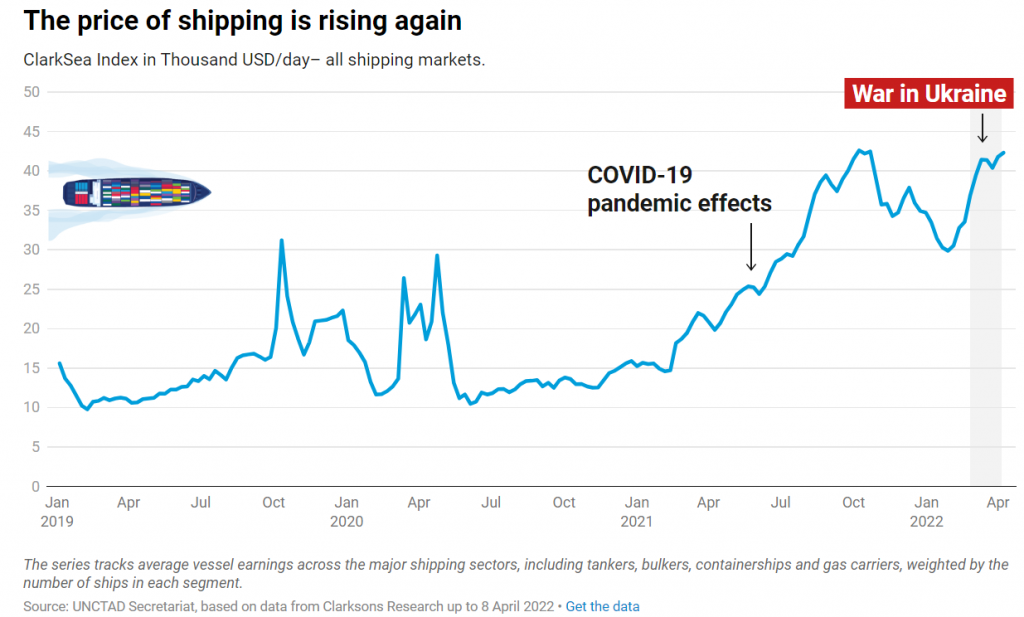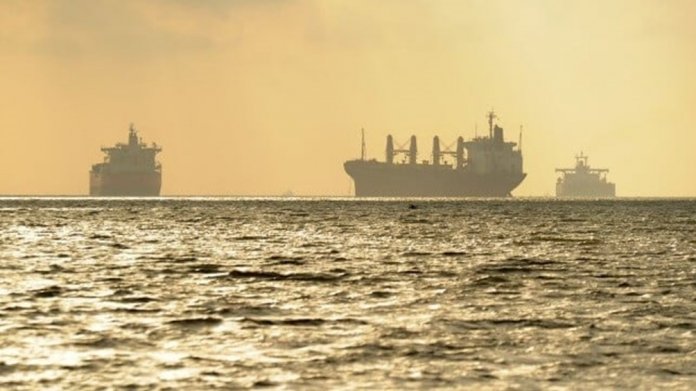A merchant ship is a vessel that transports cargo, passengers or both and the merchant shipping via sea accounts for 90% of the total world trade. In today’s global proliferation, every country is intrinsically tied to others through the extensive networks of international trade. As such, the occurrence of wars undoubtedly exerts profound impacts on international trade, leading to inflation, hunger, war etc.

The shipping industry is one of the most affected industries during wartime. The war in Ukraine has caused widespread disruption to global shipping and is likely to exacerbate ongoing supply chain disruption, port congestion, and crew crises
Let’s discuss the first one i.e., RUSSIA-UKRAINE WAR and its impacts on the shipping industry.
Ukrainian and Russian seafarers account for 14.5% of the global shipping workforce.

The Russia-Ukraine war has severely disrupted shipping and air freight. As a result of Russian forces cutting off shipping routes the logistics firms are suspending services and the air freight rates are skyrocketing.
The UN Conference on Trade and Development (UNCTAD) says the war in Ukraine is stifling trade and logistics of the country and the Black Sea region, increasing global vessel demand and the cost of shipping around the world.
The Russian economy is vastly dependent on natural resources, including oil, coal and natural gases which are mostly transported either through the pipeline to Europe or LNG and OIL TANKER ships. Still, because of lots of sanctions on Russia, the price of LNG and crude oil has increased significantly in the world market causing:
1). INCREASE IN GLOBAL PRICES
2). INFLATION
3). COLLAPSE OF ECONOMIES
4). ENERGY PRICE HIKE
5). EXPORTERS FACE HIGHER PREMIUMS AND SHIPPING COSTS
6). COST OF LIVING CRISIS
7). GLOBAL FOOD SECURITY CRISIS

Higher energy costs have led to higher marine bunker prices, increasing shipping costs for all sectors. By the end of May 2022, the global average price for very low sulphur fuel oil (VLSFO) had increased by 64 per cent with respect to the start of the year.
Also, UKRAINE is totally dependent on its agricultural products and exports but since the war started, those supplies have been restricted by the Russian Naval blockades. For example: The port of Odessa is Ukraine’s largest and major grain export port but it was under attack numerous times by Russia. UKRAINE is the biggest exporter of grains such as wheat, barley and corn. Russian vessels were also banned from entering into UK, USA, AND EU Ports. Russia and Ukraine account for about 29% of the global wheat export market.
Taken together, these increased costs imply higher prices for consumers and threaten to widen the poverty gap.
A prolonged war can lead to economic downfall as the cost of warfare exhausts the national treasury. The continuous resource allocation towards war could cause weak economic infrastructure, leading to an economic collapse.
Israel -Palestine WAR
- The conflict between Israel and Palestine could impact the movement of goods to and from Israel and it will also create a concern about the costs of Indian exports rising due to higher shipping expenses though it will have a limited impact on trade volumes.
- In light of recent developments in the Middle East, including the outbreak of war in Israel and its vulnerability to missile attacks and the incursion of opposing militias, the security of transporting goods through the port of Haifa has become uncertain
- The coastlines along the Mediterranean Sea’s southeastern shore and the Red Sea’s northern shore, the State of Israel shipped US$73.6 billion worth of products around the world in 2022 as global shipments.
- Port of Ashdod: This port, situated a mere 50 kilometres from the Gaza border, operates in an ’emergency mode’ only, subject to potential missile attacks. Furthermore, restrictions on vessels carrying Hazardous Materials (“HAZMAT”) remain in effect
- The biggest port in Israel is Haifa port which handles about 30 million tonnes of cargo every year was shut down after attacks on Israel but now working. This port is owned by Indian conglomerate Gautam Adani under Adani Ports Ltd.
References: UNCTAD, CNN

Author: Atul Kumar Rai, Junior Engineer.




